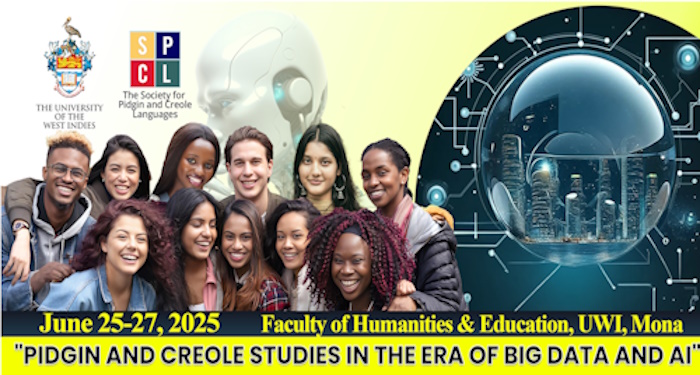- Home
- About
- Staff
- Programmes
- Sections
- Units & Centres
- News
- Contact


The Society for Pidgin and Creole Linguistics will hold its summer meeting from June 25 to June 27, 2025, at The University of West Indies, Mona, Jamaica. The conference will be held under the theme, “Pidgin and Creole Studies in the Era of Big Data and Al”. Presentations will start on the morning of the 25th and end on the evening of the 27th.
It was at Mona that the first agenda for Pidgin and Creole Studies was set at the 1959 conference organised by Robert Le Page. This agenda served the field well during the twentieth century, but a lot has changed since then in terms of global geopolitics, academia and how scholars interface with the communities they study. The practice of Creole Linguistics has also changed, and the conference will allow us to reflect on what we have achieved in almost seven decades, to assess the quality of our contribution to knowledge and the various communities we serve, and to set the agenda for the twenty-first century.
In addition, a lot is happening in the Caribbean in regard to Creole languages, with several countries discussing the introduction of bi-/multilingual education, the presence of language planning agencies in some Caribbean territories, the translation of the Old Testament into several English-related Creoles, the proposal of the opposition party in Jamaica to make the Jamaican language official if they win the next election, as well as the work of numerous nonlinguists across the region in promoting Creole languages via social media.
Abstracts for papers and panel proposals on the phonology, morphology, syntax, semantics, lexicon, or any other issue pertaining to the linguistic study of Pidgins, Creoles and other contact varieties are invited for anonymous review.
We invite the submission of abstracts for poster sessions and 20-minute papers on issues in the study of the phonology, morphology, syntax, semantics, acquisition and sociology of Pidgins, Creoles, and other contact varieties. Papers and posters may cover, but are not limited to, the following suggested themes:
Abstracts
An abstract of approximately 500 words should be submitted using EasyAbs:
https://easyabslinguistlist.org/conference/SPCL_summer2025/
After your title, clearly identify the area in which your submission should be reviewed (e.g., morphology, sociolinguistics). Please do not include your name or other revelatory information in the abstract.
Abstract submission deadline is February 28, 2025.
Acceptance notification will be sent by March 20, 2025.
See below for information about the makeup of the abstract.
Panel proposals: Ideally, there should be no more than four papers in each panel. Each panel participant should submit an abstract and include the name of the panel in their abstract. Panel organizers should submit the following information to spclsociety@gmail.com: The name of the panel, a summary of the panel, the name of each member & their affiliation, and the presentation order.
Panel proposals are also due on February 28, 2025.
Organization of the Abstract
Many abstracts are rejected because they omit crucial information. A suggested outline for abstracts follows:
Linguistics for Everyone (LIFE) Competition
Linguistics is for Everyone (LIFE) is a competition that is geared to introducing the public to topics in the study of language. Any conference presenter may choose to enter the competition by preparing afive-minute audiovisual version of their paper that is structured in a way nonlinguists can understand. All entries will be shown after one of the keynote addresses, and the 1st and 2nd place winners will be announced. Prizes will be book certificates from major publishers that publish books on Pidgins and Creoles. All videos will be uploaded to the YouTube channel of the Jamaican Language Unit. If you would like to participate in the LIFE competition, please send an email to jlu@uwimona.edu.jm.